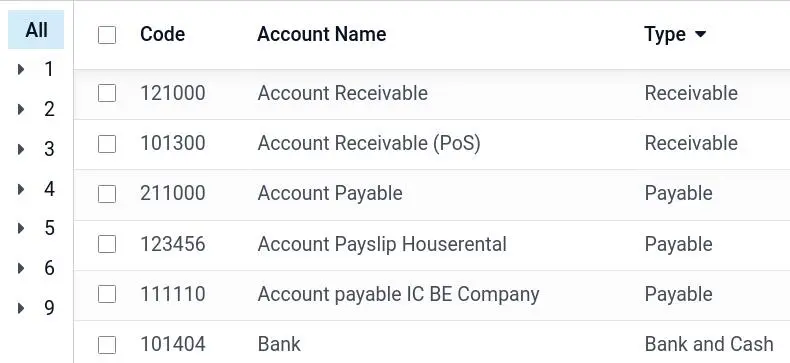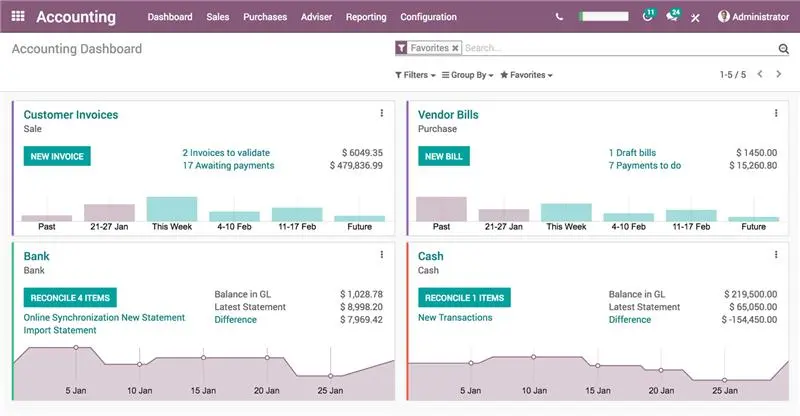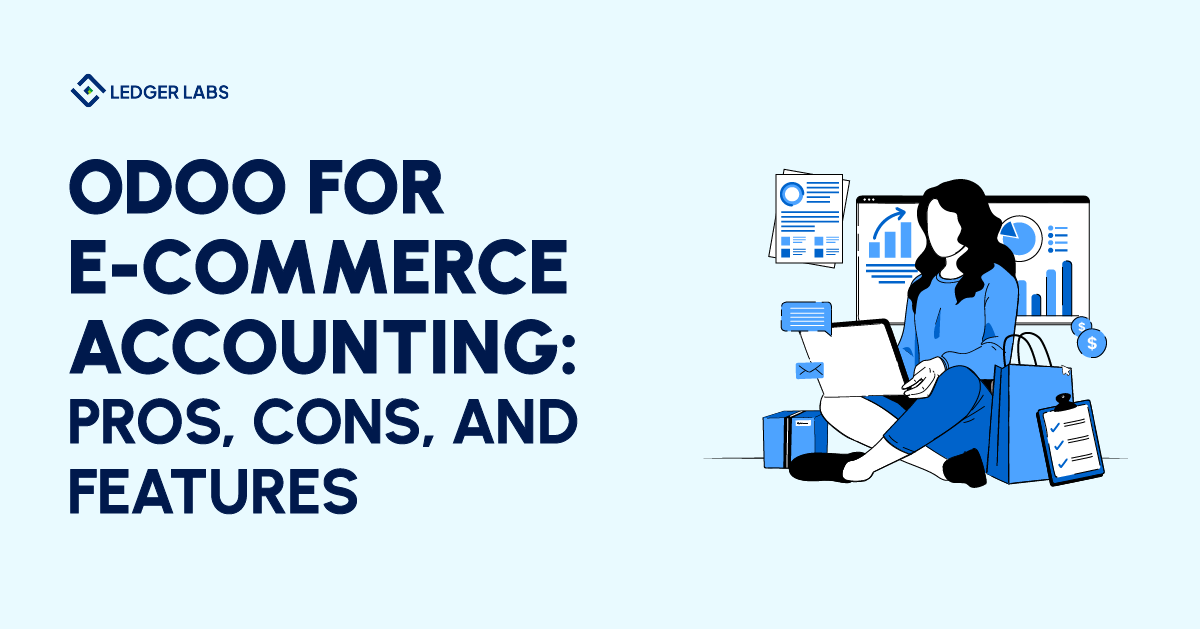More than 82000 live stores are running on Odoo, a popular ERP that gives e-commerce businesses several built-in applications to centralize data and improve efficiency.
While it is popular amongst small-sized businesses earning millions in revenue every year, it can also help businesses with growing needs, especially in the case of accounting.
Here’s everything you should know about Odoo for e-commerce accounting.
- E-commerce businesses can use Odoo’s free plan. While it gives them access to only one application, it gives them a sense of how it would fit into their organization.
- Odoo is used to perform several accounting functions, like paying bills, receiving payments, generating invoices, etc.
- 5% of Odoo stores are in the US.
- Odoo uses a double-entry accounting system to improve the accuracy of business transactions.
A deeper look at Odoo, an ERP solution for e-commerce businesses
Unlike most ERP solutions, Odoo comes with several integrated applications, eliminating the need to connect it with third-party applications to expand functionality.
This doesn’t mean you can’t connect it with other software solutions, you can – but you don’t necessarily need to.
Odoo has a wide range of features that you can customize to meet your specific business needs. You can further add or remove business applications to improve functionality as you grow.
Because it is so flexible, Odoo has become a popular choice for small businesses. It helps them begin operations with one or two applications – ones that meet the priority list – and they can keep adding more applications to meet growing needs.
The purpose of an e-commerce ERP is to give your business a centralized database to improve operational efficiency and add control to every aspect of your business. That is exactly what Odoo brings to the table and at a much lower cost than its competitors, like NetSuite and its applications.
It even offers a free plan which gives you access to one module or feature entirely. Let’s say, you are a startup interested in an accounting system with plans to expand its functionality when things start looking better for you. In that case, Odoo is the right tool for you.
Odoo is extremely secure as it offers two-factor authentication using Google Authenticator and Authy. You can also set up user-access permissions to ensure only the employees who are directly handling a project have access to that information.
An important part of running an e-commerce business is its finance management. Let’s explore its extensive list of features to understand how it would add value to your business.
Odoo’s accounting features
1. Handle account payables and receivables

You can create tailored invoice templates for your company. For example, you can change its font or add your company logo to match branding.
You can also automate invoices for sales orders and monthly subscriptions.
Odoo sends you a notification whenever you exceed the amount limit for sales orders.
You can do business in different currencies as Odoo offers currency rates daily.

2. Pay bills and receive payments more conveniently
Managing cash flow is an important part of finance management and that requires you to pay bills and get paid on time.
Odoo offers multiple payment gateways, like PayPal and Stripe. It gives customers a variety of payment options, adding to their shopping experience.
With Odoo, payment follow-ups are more efficient. You can set automated emails, SMS, and letter reminders to avoid having to follow up with each customer or client individually.
Odoo gives the option of a customer portal where customers can download receipts and pay for the products online. It is also helpful in tracking order status and managing subscriptions.
You can add a QR code to invoices making it easier for customers to pay through their mobile application.
Odoo lets you pay your bills on time and more easily. For example, you can use its batch payment feature to pay different groups in one go.
3. Reconcile invoices and payments
Odoo offers a smart tool that automatically suggests invoice and payment matches.
It also has an option where you can manually reconcile paid and unpaid invoices. This process is crucial whenever you have payments and invoices that don’t match.
Its smart tool learns from your actions. For example, it remembers the account numbers you’ve used in the past. This way, whenever you use the same account details again, it gives you suggestions to make the process more accurate.
Also, with Odoo, you can reconcile payments and invoices directly from your bank statements. This makes the process straightforward and quick.
4. Tax management
Businesses use Odoo to do their taxes, helping them calculate percentages, deductions, etc. You can generate tax reports that meet the specific requirements of your country.
You can conduct a complete tax audit to ensure accurate calculations. It helps you avoid penalties.
Also, businesses use Odoo to calculate and report their income and expenses.
5. Automation
Odoo allows businesses to upload scanned PDFs of their invoices.
It also automates the retrieval of important financial data, such as invoice numbers and customer details.
While it does give you the option to manually reconcile bank statements, it also has an AI feature that automates this process, helping you match your business transactions more accurately and in less time. It reduces manual input, eliminating the chances
of human error.
6. Double-entry accounting for accuracy
Odoo helps you record every transaction twice, first as a debit in one account and second as a credit in another. It ensures none of your transactions go unrecorded and that each one of them is traced correctly.
Odoo plans
Odoo offers different plans based on your location and accessibility.
a. One application
The first plan is the one where unlimited users get access to one application entirely free of cost. This is ideal for businesses that are simply exploring the functionality of Odoo and trying to understand whether or not this ERP would suit their needs.
What’s great about this plan is that you can choose literally any application or module. And with that, you will also get access to all the apps related to it. So if you choose an application that depends on other applications for complete functionality, you will get access to the related app for free.
Suppose you picked the e-commerce module, it will come with Website and invoicing modules, and that too, for free.
You can upgrade this plan to Standard and Custom at any time you want. Let’s just say, this plan is a great way to test the waters.
b. Standard
The second model is called Standard. This one gives you access to all modules or applications at one fixed rate.
Not only does this plan make your business more efficient but it is also the more feasible option as you can use every business application for a single fee.
The subscription fee varies depending on your country and region and also the number of users. In the US, the standard plan costs you $19.90 per month.
c. Custom
The third and final plan is called Custom. It is for businesses managing more than one company on a single database.
It is highly customizable and you can integrate it with third-party applications to increase functionality.
Again, Odoo offers 70+ modules or applications. And with the Custom plan, you can access them all for a single fee.
In the US, the Custom plan is available at $29.90 per month.
Pros and cons of Odoo
Pros
1. It is easy to use
Odoo is extremely easy to use and requires little to no technical experience.
All applications are organized, so new users don’t have to spend hours on the system, getting used to how it works.
2. It offers a modular structure
In the early days, businesses had to install and integrate different software to meet specific needs. For example, there would be one tool dedicated to handling sales operations and a different tool for managing inventory.
Odoo lets businesses handle all the operations on one system, giving them one centralized database. This way, they don’t have to deal with the challenges of sharing data across departments.
3. It is a cost-effective solution
The cost of Odoo is extremely reasonable when you compare it with other ERP solutions.
Not only does it offer access to one application for free, you can benefit from its 15-day trial period should you opt for its other plans, standard and custom.
Cons
1. It’s initial setup is complex
Odoo implementation is not as easy as NetSuite, a competitor that offers built-in APIs and connectors.
Because of this reason, Odoo implementation is time-consuming. Also, you’ll need technical support to handle setup issues.
2.Customization can be costly
The one quality of Odoo that makes it most attractive is the fact that it is highly customizable.
Now, it’s a double-edged sword because you need technical skills to customize it to meet your specific business needs. This means, additional cost to your base plan.
Here’s what you must consider before implementing Odoo into your business
While Odoo has many features to automate accounting processes for e-commerce businesses, it is still important to see whether or not it is the right choice for your business specifically.
To understand this, you must understand the specific needs of your business. So if flexibility is what you are looking for, Odoo’s customization can make it an attractive option.
But you have to see if you have the right resources to implement Odoo into your e-commerce business. It may be easy to use but you need an Odoo expert to customize its features to meet your needs.
Lastly, it is an open-source software which means it continuously adds new updates. So only choose this ERP if you have the resources ready to learn about its latest changes.
The bottom line
Odoo is great for businesses looking for an affordable and customizable ERP solution.
You can benefit from its built-in applications to improve operational efficiency, making it easy to share data between channels without risking inaccuracy or inconsistencies.
While it is simple to use, you need an Odoo expert to help you implement this ERP into your business – especially if you want to customize its modules.
This is where Ledger Labs can help you.
We have helped businesses across sizes and industries with Odoo accounting services. And we can also provide technical support with ERP implementations.
Book a consultation appointment with us to find out how we can help your business.












